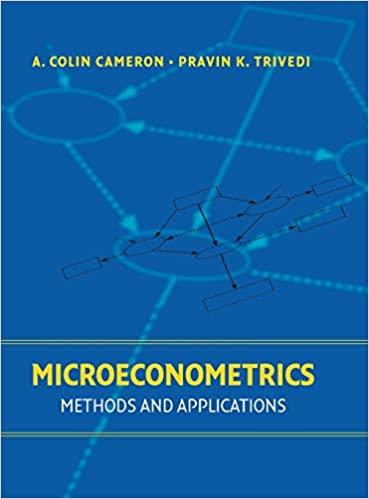Consider a finite mixture density (f(y mid theta)=sum_{j=1}^{C} pi_{j} f_{j}left(y mid theta_{j} ight)), an additive mixture of
Question:
Consider a finite mixture density \(f(y \mid \theta)=\sum_{j=1}^{C} \pi_{j} f_{j}\left(y \mid \theta_{j}\right)\), an additive mixture of \(C\) distinct latent classes, or subpopulations, with unknown mixing proportions \(\pi_{1}, \ldots, \pi_{C}\), where \(\sum_{j=1}^{C} \pi_{j}=1, \pi_{j}>0\). Here \(y\) is a count variable, and the \(j\) th component density \(f_{j}\left(y_{i} \mid \boldsymbol{\theta}_{j}\right)\) for the \(i\) th observation is expressed as
\[ f_{j}\left(y_{i}\right)=\frac{\Gamma\left(y_{i}+\psi_{j i}\right)}{\Gamma\left(\psi_{j i}\right) \Gamma\left(y_{i}+1\right)}\left(\frac{\psi_{j i}}{\lambda_{j i}+\psi_{j i}}\right)^{\psi_{j i}}\left(\frac{\lambda_{j i}}{\lambda_{j i}+\psi_{j i}}\right)^{y_{i}} \]
where \(\lambda_{j i}=\exp \left(\mathbf{x}_{i}^{\prime} \boldsymbol{\beta}_{j}\right), \psi_{j i}=\lambda_{j i}^{k} / \alpha_{j}, \alpha_{j}>0\) and \(\boldsymbol{\theta}_{j}=\left(\boldsymbol{\beta}_{j}, \alpha_{j}\right)\). Here \(k\) is either 0 or 1 . This model is the finite mixture negative binomial with \(C\) components and specializes to the finite mixture Poisson if \(\alpha_{j}=0\).
(a) Show that \(\mathrm{E}\left[y_{i} \mid \mathbf{x}_{i}\right]=\bar{\lambda}_{i}=\sum_{j=1}^{c} \pi_{j} \lambda_{j i}\) and \(\mathrm{V}\left(y_{i} \mid \mathbf{x}_{i}\right)=\sum_{j=1}^{c} \pi_{j} \lambda_{j i}^{2}[1+\) \(\left.\alpha_{j} \lambda_{j i}^{-k}\right]+\bar{\lambda}_{i}-\bar{\lambda}_{i}^{2}\).
(b) Show that any mixture model based on the first moment alone is not identified.
(c) Show that the \(C\)-component Poisson mixture based on the first two moments is identified.
Step by Step Answer:

Microeconometrics Methods And Applications
ISBN: 9780521848053
1st Edition
Authors: A.Colin Cameron, Pravin K. Trivedi





